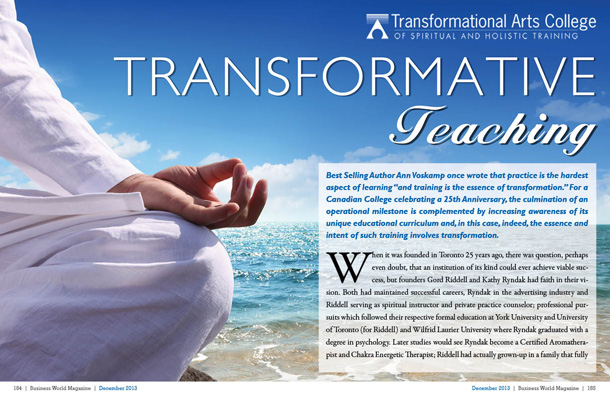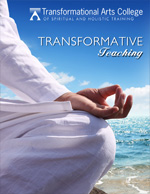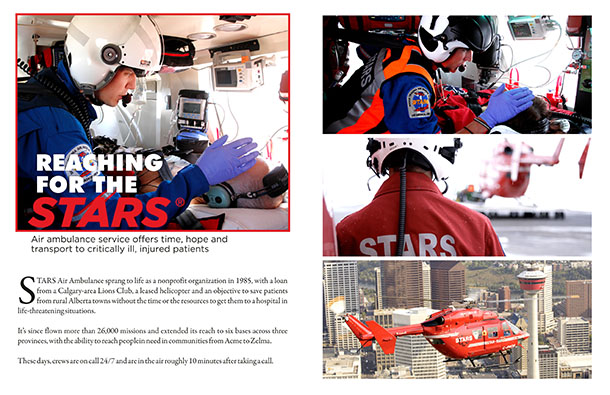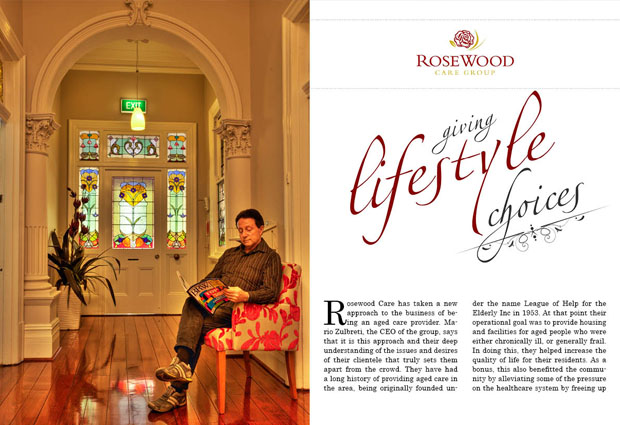
Transformative Teaching

Best Selling Author Ann Voskamp once wrote that practice is the hardest aspect of learning “and training is the essence of transformation.†For a Canadian College celebrating a 25th Anniversary, the culmination of an operational milestone is complemented by increasing awareness of its unique educational curriculum and, in this case, indeed, the essence and intent of such training involves transformation.
When it was founded in Toronto 25 years ago, there was question, perhaps even doubt, that an institution of its kind could ever achieve viable success, but founders Gord Riddell and Kathy Ryndak had faith in their vision. Both had maintained successful careers, Ryndak in the advertising industry and Riddell serving as spiritual instructor and private practice counselor; professional pursuits which followed their respective formal education at York University and University of Toronto (for Riddell) and Wilfrid Laurier University where Ryndak graduated with a degree in psychology. Later studies would see Ryndak becomea Certified Aromatherapist and Chakra Energetic Therapist; Riddell had actually grown-up in a family that fully embraced the connection between spirituality and physiological well-being. Given the time, he’ll share a story about headaches he suffered as a young boy, blissfully alleviated through his grandmother’s use of the ancient laying on of hands. Today such healing energy work could be an Asian therapy known as Reiki or as many hospitals refer to this energy work as “therapeutic touchâ€). Both Riddell and Ryndak were experienced with the applications of alternative treatments to common maladies, in fact, sacred practices imparted centuries ago by ancient mystics and healers have been increasingly abandoned in the advance of conventional healthcare delivery systems, where some kind of pill is prescribed for almost everything. Riddell and Ryndak sought to create a learning centre that could not only restore awareness of these ancient healing practices, but also advance knowledge of new science validating these techniques while training students in such methodology so they could more effectively provide healing and hope to others. Since its founding in 1988, the Transformational Arts College of Spiritual and Holistic Training has graduated and certified thousands of students. As a federally certified private educational institute, the college is committed to providing excellence in spiritually-centered curriculums at the leading edge of the holistic health education field.  The school’s programming is unparalleled in Canada and as Riddell affirms, it combines the spiritual wisdom of the ancients with the latest breakthroughs in contemporary psychology and holistic health, while also recognizing and honoring the uniqueness of each individual student. In serving as both a college and a centre of healing, Riddell and Ryndak lead a team of professionals committed to providing a supportive environment where students can hone their skills as well as forge their own path to spiritual growth, emotional healing and holistic well-being.
Advancing Acceptance
Gord Riddell will be the first to concede that when he announced plans to create the school 25 years ago, there wasn’t a lot of support. “Telling people that you’re going to open a school that focuses on our subject matter, the reactions were basically like, ‘You really are crazy,’†he laughs.
It would be only a few short years later that the World Health Organization produced a series of studies indicating that there were from 65 to 80 million people around the world who were relying on holistic medicine therapies versus conventional healthcare. Other studies revealed that consumers were annually spending more than a billion dollars on alternative medicines and treatments, and quite often, as Riddell asserts, they were paying for these services behind the back of their personal physicians. Over the years that have followed, the American Medical Association has often imparted a mixed, if not seemingly contradictory message in both advocating toward research and exploration of these methodologies while also communicating against patients’ reliance on services fulfilled by practitioners outside of the purview of modern health facilities. That said, numerous hospitals today have increasingly incorporated holistic methodologies into their delivery of healthcare, and while these techniques are often so ancient as to defy description of being new, in terms of public and professional recognition that these therapies genuinely impact beneficial well-being, that is new.
What is also new is the fact that the Ontario government is establishing a regulatory body called the College of Registered Psychotherapists. Comparable to the same institutional infrastructure governing the credentialing of nurses, dentists, physicians and surgeons, this framework will serve to develop the professional standards and mandatory minimum education requirements necessary to secure certification. In addition to providing greater assurance of safety and security to consumers who seek out such services, Riddell says the move will augment Transformational Arts’ positioning as a leader in the education of future registered psychotherapists. “We’re very excited by the new regulatory college as this will help ensure our graduates have the necessary qualifications to apply for registration which will be essential as they apply for jobs,†says Riddell.
In fact, many students of the college already have meaningful careers, working in healthcare, social services, human resources and fields involving mental health or the clergy. Riddell explains their draw to Transformational Arts is a blend of both personal enrichment and professional development. “We have a program called Discovering the Total Self and I’d say more than sixty percent of those who take the classes are there for themselves, for their own spiritual health and wellbeing; then there are those who come to the school to pursue training in spiritual psychotherapy, holistic healthcare, and as spiritual directors and spiritual coaching,†says Riddell. “You can’t really help others if you don’t know what’s going on with you. The burnout rate is very high in health-related professions. People have to understand their own limitations and strengths … our programs help them to identify and overcome obstacles to their growth as well the tools to achieve healing and have a greater quality of health.â€
Other classes focus on training for what are called “divine practitioners†or “the art of manifesting†which Riddell describes as vital to increasing awareness and openness to all that the universe provides as well as achieving a greater visionary sense of one’s potential for abundance, not to mention, gratitude for all one may already have. And to be sure, that abundance isn’t a reflected in the proliferation of material goods. Riddell refers to a message too often imparted by media about the need for bigger, faster cars, designer fashions, and other material goods. “I saw a T-shirt that said, ‘He who dies with the most toys, wins.’ I think when we reach that point of being on our death-bed, we don’t spend much time thinking about all this stuff we’ve collected over our lives, rather, we think about the relationships we’ve shared with other people,†says Riddell. To his point, the curriculum at Transformational Arts College includes courses which enable one to be enhanced and enriched with a greater perspective to beneficially impact one’s interactions with others, with one’s self, and the universe at-large.
The training is also fundamental to bridging an alternative understanding in mental health counseling. The psychotherapist, for instance, would move patients gradually toward a point of understanding as to what could be learned from whatever traumatic experience they may have endured. At an appropriate stage of recovery, the therapist will help patients glean better insight and acceptance of the roles they may have played in the situation. As Riddell explains, “People sometimes experience very terrible things… whether that’s through a job loss, relationship crisis or domestic violence. When we can transition from the perspective of being a victim, to better understanding our part in whatever may have happened, it is easier to progress to a state of healing.â€
For Riddell, the distractions and misguided messages too often iterated by media has allowed many to lose sight of humanity’s true purpose – “To just live life, love openly and experience everything that comes our way without our ego, or fear, controlling our reactions … our fears and egos often stand in the way of our passions and our intention to experience and feel something different, something greater from life.â€
At present, the Transformational Arts College of Spiritual and Holistic Training is looking toward its operational future as well as the future needs of students consistent with the regulatory requirements to be established through the new College of Registered Psychotherapists. Riddell says the college is currently busy updating and expanding literature and materials used in courses. He also says the college will move toward the implementation of online learning resources, requiring special residency programs. He notes that the online learning components have to be adapted to impart the very same learning aspects that occur in the classroom setting. That’s a tricky proposition given that large components of the Transformational Arts’ approach is experiential, it is more than just an instructor talking about it, but students actually participating and experiencing. Riddell and his team are hyped by the potential; with plans in place to overcome such problems. Given the college’s capabilities in manifesting and progressing in the possible, the Transformational Arts College is positioned for further growth.
To learn more about the programs and events sponsored by Ontario’s Transformational Arts College of Spiritual and Holistic Training, visit the college website at http://transformationalarts.com/.
Preferred Vendor of Choice:








